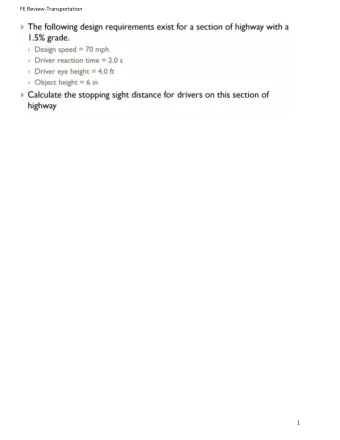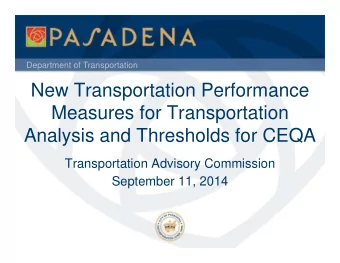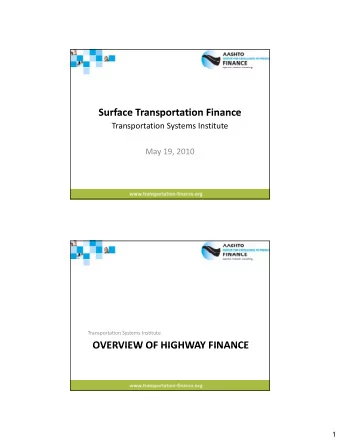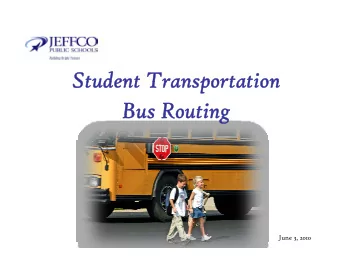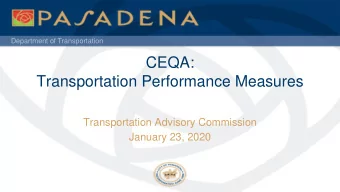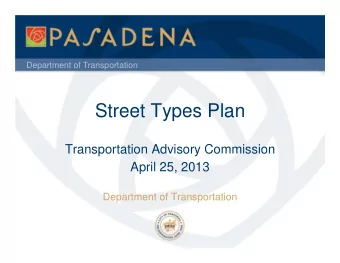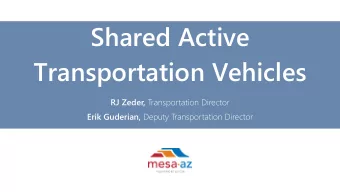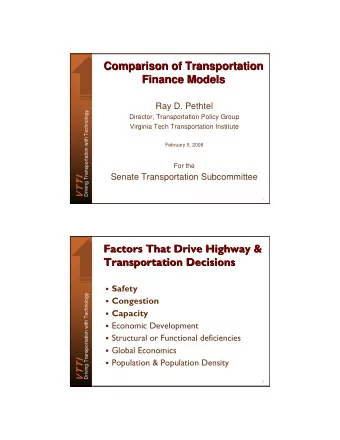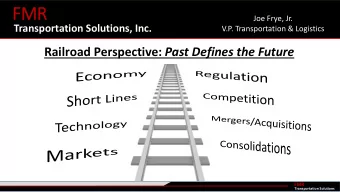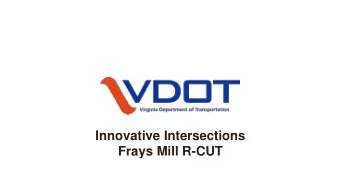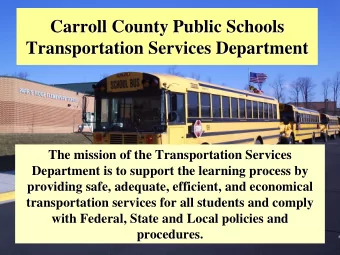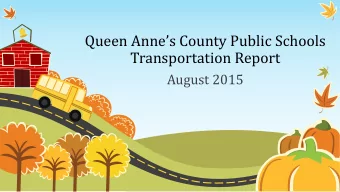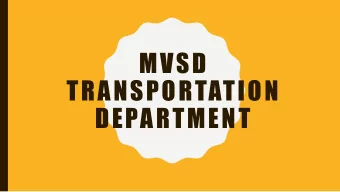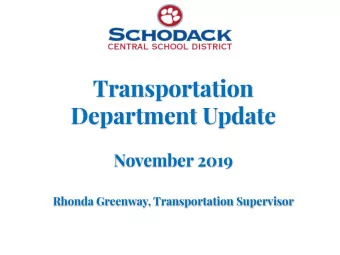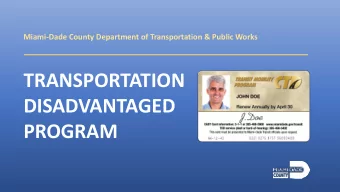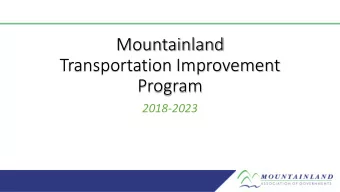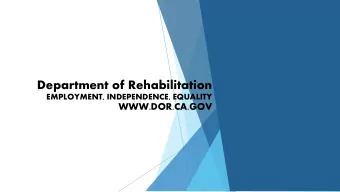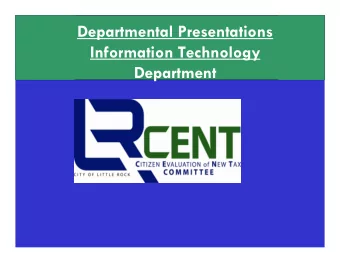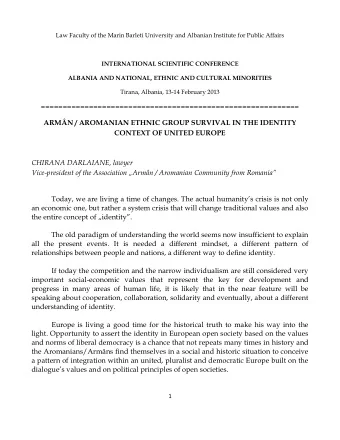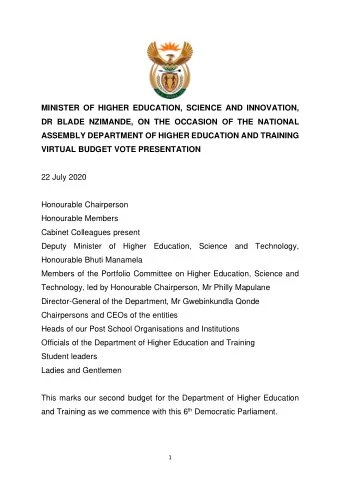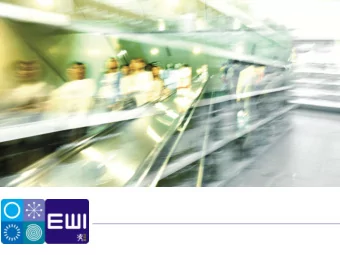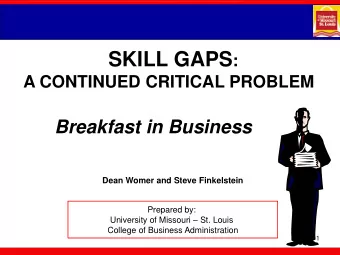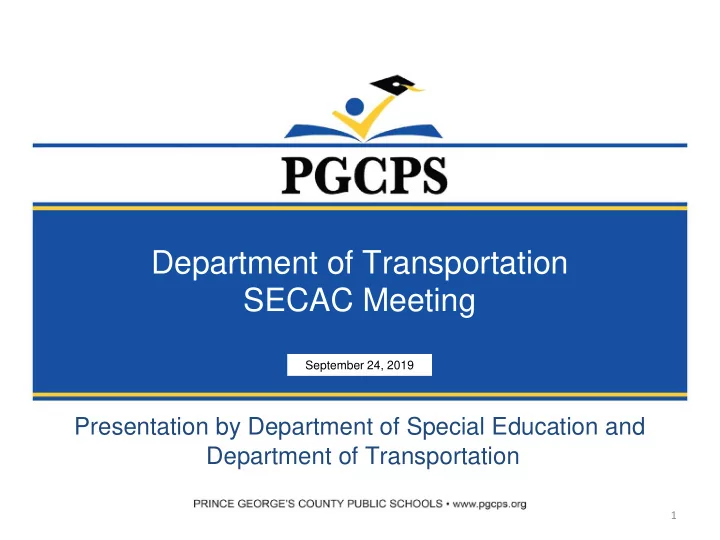
Department of Transportation SECAC Meeting September 24, 2019 - PowerPoint PPT Presentation
Department of Transportation SECAC Meeting September 24, 2019 Presentation by Department of Special Education and Department of Transportation 1 PRINCE GEORGES COUNTY BOARD OF EDUCATION Alvin Thornton, Ph.D., Chair Edward Burroughs III,
Department of Transportation SECAC Meeting September 24, 2019 Presentation by Department of Special Education and Department of Transportation 1
PRINCE GEORGE’S COUNTY BOARD OF EDUCATION Alvin Thornton, Ph.D., Chair Edward Burroughs III, Vice Chair, District 8 David Murray, District 1 Joshua M. Thomas , District 2 Pamela Boozer-Strother , District 3 Patricia Eubanks, District 4 Raaheela Ahmed, District 5 Belinda Queen, District 6 K. Alexander Wallace, District 7 Sonya Williams, District 9 Sandra D. Shephard Curtis Valentine, M.P.P. Joshua Omolola, Student Board Member Monica Goldson, Ed.D., Secretary Treasurer and Chief Executive Officer 2
MISSION STATEMENTS School District Mission PGCPS will be a GREAT school system recognized for providing education services, which ensure every student in our diverse school district graduates ready for college and careers in a global society. Transportation Mission To deliver efficient transportation and fleet services that enable all students to arrive at their destination safely and on-time every day. 3 Transportations and Central Garage
SUPPORTING THE STRATEGIC PLAN 1. Support safe and supportive environments by providing safe transportation and reliable fleet services 1. Support organizational effectiveness through improved communications and customer service Core Services and Outcomes • Promote a safe and supportive environment on school buses and in offices • Maintain a safe and reliable school bus fleet • Be proactive in communications with stakeholders • Deliver excellent customer service • Develop efficient routes 4 Transportations and Central Garage
Presentation Outcomes… Participants will gain knowledge and understanding with the following: ☑ Transportation as a Related Service/MSDE TA Bulletin #16-01 ☑ Transportation Accommodations & Modifications ☑ Training for Bus Drivers and Aides ☑ Resolving Transportation Complaints ☑ Questions When Transporting Students Receiving Special Education Services Parking Lot for Questions: https://bit.ly/2l1CbN3 5
United States Department of Education (USDE), Office of Special Education Programs (OSEP) In 2003, OSEP issued a memorandum entitled, Ensuring Safe and Appropriate Transportation for Children with Disabilities . It states: “Transportation providers play an integral role in the school lives of many children, including children with disabilities, which makes effective communication between the school and the providers essential. We believe that, for the safety and well-being of all children who ride school buses, including children with disabilities, it is crucial that they are appropriately and effectively transported by well-informed and well- trained transportation providers.” Parking Lot for Questions: https://bit.ly/2l1CbN3
Transportation and Central Garage Organization
*NEW” Special Education Transportation Coordinator • What is the Role of the Special Education Transportation Coordinator? • Works closely and collaboratively with the Department of Special Education and school partners to ensure the provision of transportation services for students with disabilities within comprehensive and special school settings • Represents the Department of Transportation at IEP meetings • Works with transportation operations staff in developing bus routes and placing students on appropriate routes 8
Handout Parking Lot for Questions: https://bit.ly/2l1CbN3 9
Transportation as a Related Service Transportation (Part B) includes – (i) “Travel to and from school and between schools, (ii) Travel in and around school buildings, and (iii) Specialized equipment (such as special or adapted buses, lifts, and ramps) if required to provide special transportation for a child with a disability.” (34 CFR §300.34 (c)(16) Parking Lot for Questions: https://bit.ly/2l1CbN3 10
Determination of Related Service Transportation It is recommended during an IEP meeting that qualified personnel determine if a child with a disability requires the related service transportation. Discussions should include: ● pick-up and drop-off location; ● length of ride time to and from the school; ● additional personnel needed for transport ● specialized equipment needs ● other supports as needed A transportation representative as a part of the IEP Team can provide valuable information that is critical in the development, review, and revision of a student’s IEP. 11
Do most students with disabilities and IEPs need special transportation? No. Most children with disabilities are able to use the same transportation system as their classmates who don’t have disabilities. Sometimes just adding special equipment or aides to the school bus is all that is required of a student with a disability. Students who are granted a special transfer requests are not entitled to transportation services. Parking Lot for Questions: https://bit.ly/2l1CbN3 12
Accommodations & Modifications 13
Students with Mobility Needs Wheelchair Types 14
School and Home Partnership Wheelchair Safety Parental Responsibility • Chair size • Book bag and O2 tank security • Chair integrity • Wheels • Frame • Battery (manual mode for power chairs) • Brakes • Cleanliness 15
Can I request that the vehicle providing transportation to my child have specialized equipment? • One issue that arises is air-conditioning for students with disabilities. (Question 6 on MSDE TA Bulletin) • Climate-controlled transportation is not explicitly required under the IDEA. • If an IEP team determines that a child needs climate- controlled transportation….and the child’s IEP specifies that such transportation is necessary, the school system must provide this special transportation at no cost to the parents. 16
Transportation and Scheduled Closures • Non-Public Transportation Services When PGCPS is Closed: ○ PGCPS provides transportation services based on the current non-public school calendar ○ When PGCPS is on spring break, we continue to transport for non-public schools that remain open. When non-public schools are on spring break, PGCPS does not provide transportation. 17
Transportation and Inclement Weather INCLEMENT WEATHER ANNOUNCEMENTS • Decisions are made between 5:00am-6:00am which must be authorized by the CEO or designee and announced by 6:30am • Two-Hour Delays: NO Work-Study/ECC/Pre-K/Field Trips/Special Education Programs • Non-Public Schools: May follow their local jurisdiction protocols. The decision to extend reduced schedule days on a two-hour delay is at the discretion of the non-public school. 18
What is the maximum amount of time my child may spend on a school bus traveling to and from school? • Federal regulations do not address allowable travel distance or length of ride on a school bus to and from school. • When considering an educational placement, the distance to and from school and the specific length of ride time must be considered- the placement closest to the student’s home address is considered first. • Critical to the consideration is that the length of ride time does not prevent the child from receiving a school day commensurate with his/her non-disabled peers, including both arrival and departure time. 19
Pick Up and Drop off Determination Curb to Curb • Neither IDEA nor Section 504 of the Rehabilitation Act specifically addresses whether transportation should be from a designated bus stop or from the curbside in front of a child's home. This decision is left to the IEP team and based upon the individual needs of the child. • It is not door to door service….. it is curb to curb service. 20
Confidentiality Students with disabilities are protected under several laws and regulations: These laws require that bus drivers and attendants refrain from: • Discussing students with anyone other than the student’s parent/guardian or school staff • Talking about problems in front of the student • Gossiping or complaining about a student or situation At NO TIME may a school bus team member share information about a student with anyone other than that student’s parent/guardian or school personnel. The only exception would be in the event of an emergency. 21
Protocol for Reviewing Video Tapes of School Buses 1. All requests for reviewing tapes on school buses will be requested through the Transportation Supervisor / Bus Lot Foreman. 2. The school bus is routed to the Skyline Administration Building for removal of the video drive. 3. Transportation Department employee will retrieve the video, review the content and make a copy to be shared with appropriate school personnel. 22
Training for Bus Drivers and Aides • All transportation personnel receive annual training at In-Service: • Hands-on Training to support students with special health care needs • Use of specialized equipment-wheelchair/safety vest • Training on resolving bullying of students riding the school bus • *NEW* Crisis Prevention Institute (CPI) Nonviolent Crisis Intervention Training offered for Transportation through Safe Schools Grant 23
Recommend
More recommend
Explore More Topics
Stay informed with curated content and fresh updates.
